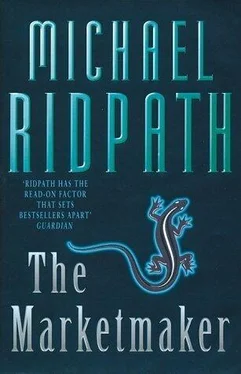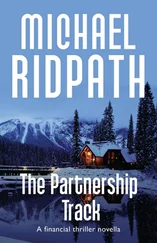Immediately afterwards, Luís called Nelson, who said he would be up the next day. Once again, he was encouraging. According to Nelson, everything was going to plan.
The next morning, Saturday, Luís showed me round the garden. It stretched up a gentle incline from the house for what seemed like half a mile, until it merged into a forest. It took my breath away. On either side and in front loomed large, absurdly shaped mountains, obviously with the same geological provenance as those that surrounded Rio. One had a sheer rock-face, the others were covered with trees on their lower slopes and meadows higher up. The garden itself was a valley of lawns, trees and shrubs, with a long lake down one side. The air was cool and clear, though a little damp, and filled with the sound of running water and birds squabbling. There were swans, both white and black, flamingos, exotic ducks and a variety of other types that I didn’t recognize.
‘It’s beautiful,’ I said.
‘It was designed by Burle Marx, a German who came here during the war. It is extraordinary. There are over two thousand species of plant in this garden. And it has seen some wonderful parties in its time.’
I glanced at Luís. He didn’t seem a great entertainer. He seemed a tall, lonely man, standing up well to adversity.
‘How long have you owned it?’
‘About five years.’
It must have cost serious money. I knew that Isabel came from a wealthy family, but I had no idea what that wealth translated to. It was strange to me to see a house and garden like this being used as a home. In England it would have been dotted with nice ladies in tweed skirts gently ushering visitors This Way.
Luís read my thoughts. ‘We didn’t always have money. Or, at least, I didn’t. I come from an old family, one of the quatrocentonas, the Portuguese families that came over to Brazil four hundred years ago. My great-grandfather had plantations in the state of São Paulo that were as big as some European countries. He had thirty thousand slaves. Then came emancipation. Then the collapse of coffee prices. Then the crash of ’twenty-nine. My grandfather wasn’t astute. My brother still runs the rump of the property, a small coffee plantation. But I left.’
There was a kerfuffle as a white swan tried to mount a black one. Luís laughed. ‘True Brazilians. You see!’
‘You came to Rio?’ I prompted.
‘Yes. I went to university there, and joined a big bank. I found money fascinating. For many years now Brazil’s financial system has been pretty complex. With inflation and interest rates at several thousand per cent a year, there were opportunities to make a lot of money. In nineteen eighty-six I decided to make some of that money for myself, and so I started Banco Horizonte. As you know, it’s now one of the biggest investment banks in Brazil, and in fact we’re beginning to think about expanding overseas. So that’s how I can afford all this.’
Luís made no attempt to hide his pride, and indeed he had a lot to be proud of. ‘But it’s a shame to build this up and see it die with me. We wanted a son, Vivian and I.’
‘Vivian was your wife?’
He nodded. He turned back and looked at the fazenda. ‘She never saw all this. All that I have created. Or perhaps she can see it now.’
‘There’s Isabel,’ I said.
Luís snorted. ‘Isabel! What chance have I of getting her to work for the bank? She’s far too stubborn. You heard her. My daughters! I suppose no father understands his daughters. But I just don’t know why Isabel and Cordelia won’t for once do something sensible. Maybe this episode will make them think again.’
‘It might. But I’m not sure that’s a good thing.’
He turned to look at me, listening closely.
‘They’re just like you, aren’t they? They want to go their own way. Do their own thing. The fact you disapprove just encourages them. I’m sure that’s true of Isabel.’
Luís gave a brief, dry laugh. ‘I suppose you’re right.’
‘That’s one of the reasons I like her.’
There was a pause. He studied me. ‘You are close, aren’t you? More than colleagues. More than friends?’
For a moment I panicked, imagining myself accused by an indignant Latin father of deflowering his daughter. But Luís’s gaze was warm, encouraging.
I nodded.
Luís turned to continue up the hill. ‘Bem,’ he muttered, I think. I couldn’t quite hear.
We decided to stay at the fazenda. It was tough on Nelson; he had to make the hour and a half drive up from Rio every day. But it was good for Luís, and good for me. We were optimistic. As long as we could put up with the waiting, Isabel would be free.
On Sunday night Cordelia and Fernando left for the city by helicopter. Zico called again. I listened in to the conversation. I heard what I thought were the words thirty million, and then a bit later Luís countering with two million. We were still a long way apart, but we were drawing ever closer. At this rate, one day in the next few weeks, Isabel would be released. I thought about returning to London. Things seemed to be on track, and there was little more that I could do to help. And there was a limit to how long I could stay.
We were beginning to get used to the slow tempo of the negotiations. But on Tuesday, day eight, all that changed.
Nelson came up in the morning for breakfast. He seemed excited.
‘I have some news.’
Luís looked up from the tiny roll on his plate. He still wasn’t eating much. ‘About Isabel?’
‘Yes. The police have received a tip that they’re taking seriously. You know the Disque Denúncia?’
Luís nodded.
Nelson explained for my benefit. ‘It’s an anonymous phone line the public can use to tip the police off about criminal activity. Apparently, about a week ago, a blindfolded woman was seen being led from a car to a small shed in the middle of the night. The shed is in Irajá, in the north of the city. The police are going to check it out this morning.’
‘They will be careful, won’t they? They’re not going to storm the place or anything?’
‘Da Silva assured me they won’t. If they find Zico and his friends, they’ll just watch them, and arrest them after Isabel is released.’
‘Are you sure?’ Luís glanced at Nelson suspiciously.
‘I’ve known Da Silva for fifteen years. He’s given me his word.’
Luís looked worried, and I shared his unease. Nelson was an ex-cop so he would say we could trust the police, wouldn’t he? But, on the other hand, they would be more likely not to lie to him. We would see. In any case, there was no doubt in my mind that a dramatic rescue attempt was not the best way to release Isabel. The anxiety grew the more I thought about it.
Nelson could see Luís’s reaction as well.
‘The shed will be under surveillance now,’ he said. ‘Da Silva said he would telephone us here this morning.’
The detective was as good as his word. The police had found the shed empty. It had a basement, and there were plenty of signs that this had been used to hold a kidnap victim. There were marks where a tent had been erected in the middle of the floor. This was apparently a common way of holding kidnap victims so that they couldn’t see their captors. There were food wrappers, empty plastic bottles of mineral water, and some scraps of bread that was quite fresh. There were no signs of blood.
Someone had been held there, and had recently been moved.
Half an hour later the phone rang. But it wasn’t Da Silva. It was Zico.
This time the conversation became quite heated. I could follow very little of it, but Luís was as angry as I had seen him. After a couple of minutes he slammed down the phone and turned on Nelson, eyes blazing.
Читать дальше












